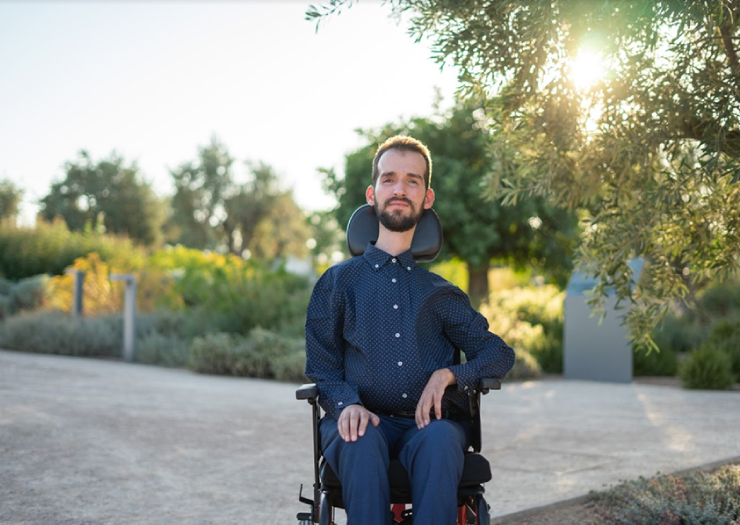
News
MEP Stelios Kymbouropoulos and students of Frederick University discussed the rights of people with disabilities
February 2nd, 2021
 “Everyone should live wherever they want, with whom they want, under the conditions they want”
“Everyone should live wherever they want, with whom they want, under the conditions they want”Frederick University recently held a webinar with psychiatrist and Member of the European Parliament, Mr. Stelios Kymbouropoulos, as keynote speaker. The discussion titled: "People with disabilities and Independent Living", focused on the new EU’s Disability Strategy, the need to deinstitutionalize people with disabilities and their right to choose their lifestyle. Students from Frederick University's School of Education and Social Sciences participated in the discussion.
Stelios Kymbouropoulos, a member of the European Parliament since May 2019, was diagnosed at the age of 14 with Spinal Muscular Atrophy, a progressive disease which caused him severe motor disability.
However, "I am active and motivated", he pointed out during the online discussion, talking about his actions in Brussels and focusing on his work as a member of the Labor and Social Affairs Committee of the EP. In this context, the Greek MEP made special reference to the new EU Disability Strategy 2021-2030 which is expected to be published by the end of March. Mr. Kymbouropoulos contributed to the development of the Strategy and during the discussion he explained its two main pillars: "The choice of 'I want', the right to choose and the implementation of these choices are at the heart of the rights of the disabled people and we must claim it more and more often" he said to show that the main demand is the deinstitutionalization of people with disabilities. "It was evident from the health crisis, especially in the first wave, how many more people were dying in institutional-type structures: nursing homes and institutions where the disabled lived. They were hotbeds of death and this is unfair. So every person should be able to have the right to live where they want, with whom they want and under the conditions they want." For this to happen, explained Mr. Kymbouropoulos, the establishment of the profession of personal assistant is needed, which is the second pillar of the European Disability Strategy. “Personal assistants are the people who will support the needs and choices of disabled people when their own bodies cannot do so. I am such a person that I need the support of a personal assistant and I think it is the quintessence for the life of many disabled people,” he said.
The students who participated in the discussion raised many interesting questions about dealing with social ignorance towards the issues that concern people with disabilities, and more specifically about the tools that can help them live independently. "The goal is to have a society in which all different physiologies can fit and function. I use a wheelchair to get around, it's my physiology. Someone else uses a cane to see, it's their own physiology. Someone else uses sign language to speak. We must integrate the different physiologies into the whole of society. Until then, we talk about disabilities, not because there is a problem, but because we put up barriers for members of society to function freely, based on their choices and desires."
Responding to a related question, Mr. Kymbouropoulos said that one step to remove these obstacles is the establishment of the personal assistant and another is accessibility. "I'm not just talking about the sidewalk. Access to health, education, work. We need to look at all aspects of life and create the bridges to remove inequalities." When asked how accessibility can be implemented in practice, the MEP stated that "it takes time, effort and assertion on many levels. We need to go out and shout, we must not let others claim it for us. I have to try with all the tools I have available to change the world.” According to him, equal opportunities will come through school, discussions with young people, through recognition and through educating young people about what means to be a human. "Equal opportunities will come through education and knowledge to parents whether they have disabled children or not. For those who have disabled children, to love and appreciate their child and not to 'curse' themselves for the child they have. For those who do not have disabled children they should create the foundation that there is no fear, there is no stigma to pass on to the children. And on the part of the state, to establish rules that if they are not applied, there will be sanctions. There should be a check on the legislation that a state has enacted."
Closing the discussion, Mr. Kymbouropoulos stated that "to change as a society we must first change our small inner world and then our own society in order to achieve the best result."
The discussion was coordinated by Dr. Stavros Parlalis, Assistant Professor in the Department of Psychology and Social Sciences at Frederick University, and Dr. Alexandros Argyriadis, Assistant Professor in the Department of Nursing at Frederick University. Dr. Stelios Stylianou, member of the academic staff of the MEd in Special Education of Frederick University, also participated in the discussion.
You can watch the discussion on Frederick University's YouTube channel.

